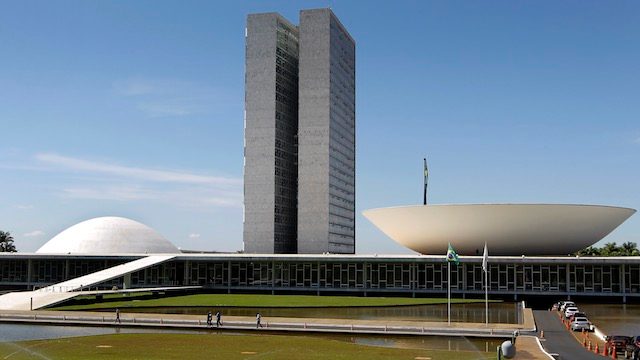SUMMARY
This is AI generated summarization, which may have errors. For context, always refer to the full article.

BRASILIA, Brazil – Brazilian President Dilma Rousseff’s battle to cling to power enters a crucial phase Wednesday, April 6, as lawmakers hear a motion on whether there are grounds to impeach her.
A congressional committee has wrapped up its preliminary sessions and will now hear lawmaker Jovair Arantes present his recommendation on whether congress should vote to open an impeachment trial. He is expected to make his recommendation to the commission at 1700 GMT.
Brazil’s political crisis rumbled on Tuesday, April 5, when a Supreme Court judge ordered a new impeachment committee be set up to consider allegations against another top official, Vice President Michel Temer.
Rousseff meanwhile announced she would postpone a looming reshuffle of her cabinet until after the lower house of congress votes on the impeachment proposal.
The crisis has brought the government close to collapse, as it battles a deep recession in the country due to host the Olympics in August.
A long recession and huge corruption scandal have pushed the government to the brink of collapse. This mess was exacerbated last week when Temer’s powerful PMDB party broke away from its coalition with Rousseff.
Abandoned by her main partner, Rousseff is now racing to secure enough votes in Congress to block the lower house from sending her to face impeachment in the Senate.
Rousseff’s chief of staff said last week a reshuffle was imminent. In a country with dozens of political parties, ministerial posts and other government jobs have become key bargaining chips.
But the leftist leader said Tuesday she would not reshuffle her cabinet before the lower house vote, expected in mid-April.
“We won’t touch anything for now,” she told reporters.
Newspaper O Globo reported that the president’s camp was reluctant to move too soon for fear that supposed new allies could betray her and vote to impeach her anyway.
Lobbying for political survival
Rousseff’s critics accuse her of manipulating the government’s accounts to boost public spending during her 2014 re-election campaign and hiding the depth of the recession.
Attorney General Jose Eduardo Cardozo lambasted the case against her Monday in final arguments before the impeachment committee.
He accused the president’s opponents of violating the constitution and seeking revenge for their own legal woes in a graft scandal centered on state oil company Petrobras.
Rousseff, 68, needs at least 172 abstentions or votes against impeachment in the lower house.
If the case proceeds to the Senate, a two-thirds vote there would remove her from office.
Rousseff has sent out her predecessor and mentor, Luiz Inacio Lula da Silva, to lobby on her behalf. He is courting small centrist parties with promises of ministerial posts vacated by the PMDB.
Call for new elections
Rousseff’s approval rating has plunged to 10%, polls show.
But those working to oust her face serious allegations themselves, including the PMDB’s Eduardo Cunha, the house speaker who is leading the impeachment push.
He was charged in the scandal last year with taking millions of dollars in bribes.
Temer, who will become president if Rousseff goes, has also been linked to the Petrobras scandal, although he has not been charged.
A Supreme Court judge on Tuesday ordered Cunha to launch a new impeachment committee to consider allegations against Temer.
Like Rousseff, Temer is accused of taking out unauthorized government loans to fudge the government’s books.
Rousseff may also find out this week if the Supreme Court allows Lula to become her chief of staff, which would shield him from prosecution.
He has been barred from assuming that job over charges in a case connected to the Petrobras scandal.
Former minister and presidential candidate Marina Silva called for the speeding up of a separate probe of alleged electoral irregularities against Rousseff and Temer.
If those allegations are proved, she told a news conference, “the way forward is to hold new elections.” – Damian Wroclavsky, AFP / Rappler.com
Add a comment
How does this make you feel?
There are no comments yet. Add your comment to start the conversation.